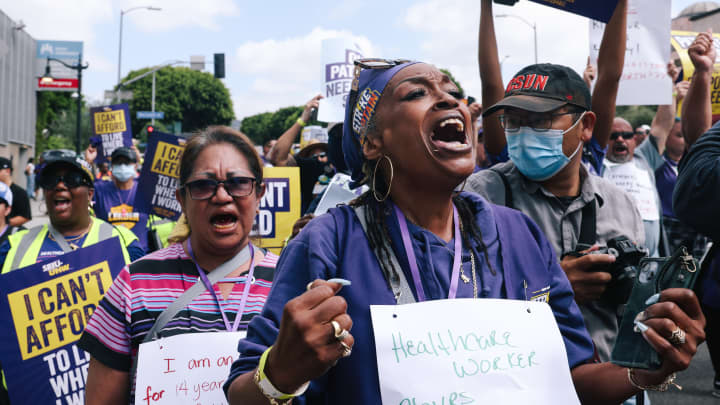
More than 75,000 workers at the largest nonprofit health-care provider in the United States threatened Friday to if an agreement is not reached to resolve a staffing crisis by the end of next week.
A union coalition warned that its members will walk out for three days in October at hundreds of health facilities across California, Colorado, Oregon, Washington, Virginia and Washington D.C., if a deal is not reached to relieve the issue.
The Coalition of Kaiser Permanente Unions issued the ultimatum after their final bargaining session concluded without an apparent resolution.
The unions said they will go on strike from Oct. 4 to 6 if an agreement is not reached when their current contract expires Sept. 30.
Kaiser Permanente serves nearly 13 million patients. It operates 39 hospitals and more than 600 medical offices across eight states and the District of Columbia.
Read CNBC's latest health coverage:
Dave Regan, president of SEIU-United Healthcare Workers West, said that Kaiser has failed to adequately address a staffing crisis that has led to dangerous wait times for patients.
"Kaiser executives refuse to acknowledge how much patient care has deteriorated or how much the frontline healthcare workforce and patients are suffering because of the Kaiser short-staffing crisis," Regan said in a statement
The Coalition of Kaiser Permanente Unions' membership includes medical assistants, surgical and lab technicians, pharmacists and administrative staff among other health-care workers. Several unions voted overwhelmingly to authorize strikes at Kaiser last week.
Kaiser has called the unions' claims misleading and urged employees to resist a call for a strike.
"The Coalition unions are positioned to strike in October. However, for the last 26 years of our historic labor-management partnership, we have reached agreements with the Coalition every time, with no strikes. A strike notice does not mean a strike will happen," Kaiser said in a statement.
"Our top priority is caring for our members and patients, and we have plans in place to ensure we can continue to provide, high-quality care should a strike actually occur," Kaiser said. "To be clear, we will continue to bargain in good faith until we reach a fair and equitable agreement that strengthens our position as a best place to work and ensures that the high-quality care our members expect from us remains affordable and easy to access."




